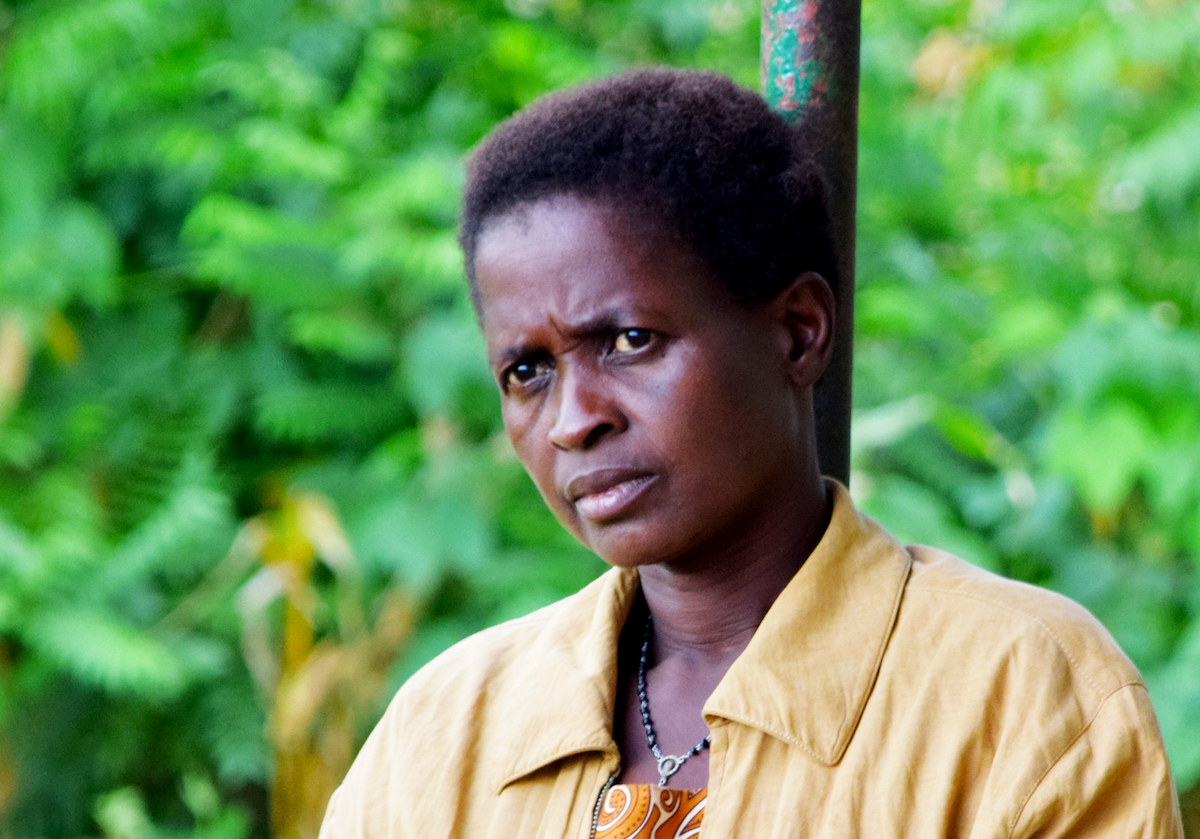Highlights

Fruit & vegetables
During the 2020/21 season, 5,032 smallholder farmers achieved 4,324.5 metric tons commodity volume enabling producers to achieve an average earning of 2,958 Euros per annum. The number of hectares under sustainable management is 6,234 ha.

Soy
A total of 75,091 smallholder farmers recorded 246,625 metric tons produced under better management practices, showing 65 percent change and improvement in yield and/or productivity. The number of hectares under sustainable management is 153,694 ha.

Livestock
The number of smallholder producers that implement good practices increased from 390 to 478 with a percentage share of 65 percent of women in decision-making roles. The number of hectares under sustainable management is 60,700 ha.
Results

52,640
farmers with income increase

289,000
Hectares brought under sustainable management

27
Corporates who are testing solutions with Solidaridad

Forging ahead
Expanding reach and deepening impact
In 2021 we continued with our holistic approach that supports smallholder farmers through every step of the value chain. With more farmers trained in climate-smart practices, and greater resources on the market and policy level, we’re moving closer to our vision of a fair and sustainable supply chain.
By the end of 2021, the Southern Africa Regional Expertise Centre had registered a total of 21,800 farmers that were supported by different projects focused on improving farming practices that improve the quality of their soils. We also trained a total of 22,676 farmers in good practices that farmers can apply in their farming businesses. Farmers’ capability in demonstrating good practices have been very positive as reflected in a total number of 44,151 farmers adopting practices, such as using certified seed, inoculants, practicing crop rotation, intercropping, applying mulching and composting. The establishment of demonstration sites have helped farmers to build nurseries and also promoted peer-to-peer learning. As a result of the interventions delivered, the yield for soy farmers increased to an average of 1.1 tonnes per hectare from 0.6 tonnes. Our interventions also helped the farmers to be more competitive and supported some to be certified under local Good Agricultural Practices (local GAP) programmes in South Africa. Communities were supported to establish marketing centres for livestock activities in Zambia and the Solidaridad Cattle Grading application was adopted by the Ministry of Agriculture in Zambia for wider deployment.
We are raising the productivity and capabilities of smallholder farmers in soy and fruit and vegetables. The total volume commodity sourced for the entire region is over 250,950 Metric tons. The soy programme contributes about 98 percent (246,625 metric tons) of total production, while the fruits and vegetables programme amounts to 2 percent (4,324.5 metric tons) of the total volume of commodities sourced within the southern region. Furthermore, in South Africa, 427 farmers were local.gap certified in 2021.
In our work we are also enabling networks and mobilizing local entrepreneurs to be part of inclusive business ecosystems. A total of 156 local small and medium enterprises (SMEs) were supported with skills, funds, management and business advice to provide services to farmers across the projects within Solidaridad Southern Africa. These SMEs range from threshing, soil testing, extension information and logistics. One tangible example is our poultry SMEs on the Kfuya programme, which provided the soy farmers (or women in their households) the opportunity to start a side business raising Sasso day-old chicks up to six weeks, then selling them to the market as live ‘teen’ birds, eggs, or protein source. They have been provided through Malim’bewu with financial literacy and farming-as-a-business training. Twenty of these SMEs also received Malim’bewu input loans for the chicks, feed, vaccinations, etc. on a 50 percent basis with repayment after the eight week cycle once they are able to sell the chickens. The SMEs also were presented the business model for the poultry business and co-invested through constructing the chicken coups and initial set-up themselves. This model motivated them to take ownership of the business and we were encouraged to see them taking the opportunity to heart and construct quality structures that will last. Input loan facilities have also been incorporated into the planting programmes for soy and horticulture in Mozambique, helping farmers supplying the Kvuno Pack House with produce, which is then sold to local establishments.
During 2021 Solidaridad Southern Africa mainly focused on continued support to multi-stakeholder platforms, stakeholder engagements and baseline assessments for the priority commodities in the respective project areas. These baseline studies are instrumental for our understanding of the policy environments, including structures, mechanisms and rules that govern institutions and processes with an impact on the priority commodities and thematic areas. Based on the outcomes, interventions will be implemented to strengthen capacities of project participants and partners to formulate policy priorities for the respective commodities from 2022.
Most Significant Changes
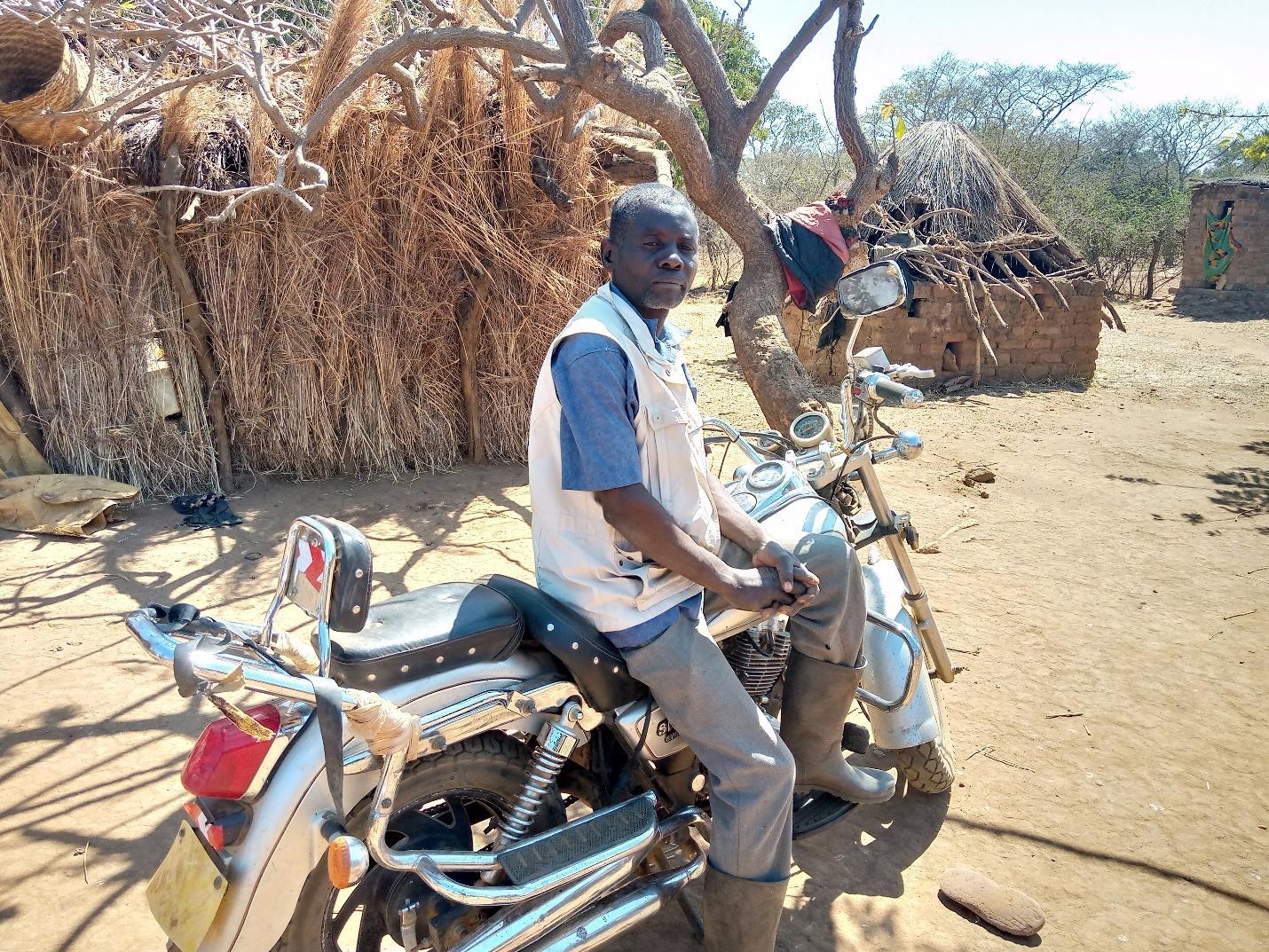
KATETE SOYBEAN FARMER PROVES THAT AGRICULTURE IS MORE THAN JUST COWS & PLOUGHS
As a result of solidaridad interventions which consist of access to certified seeds, inoculants and soil tests, the average productivity of soybeans in Zambia has been consistently increasing from 500kg per hectare in 2018 to 1120kg per hectare in 2021, highlighting the potential for smallholder farmers to benefit from soybean production to support sustainable livelihoods.
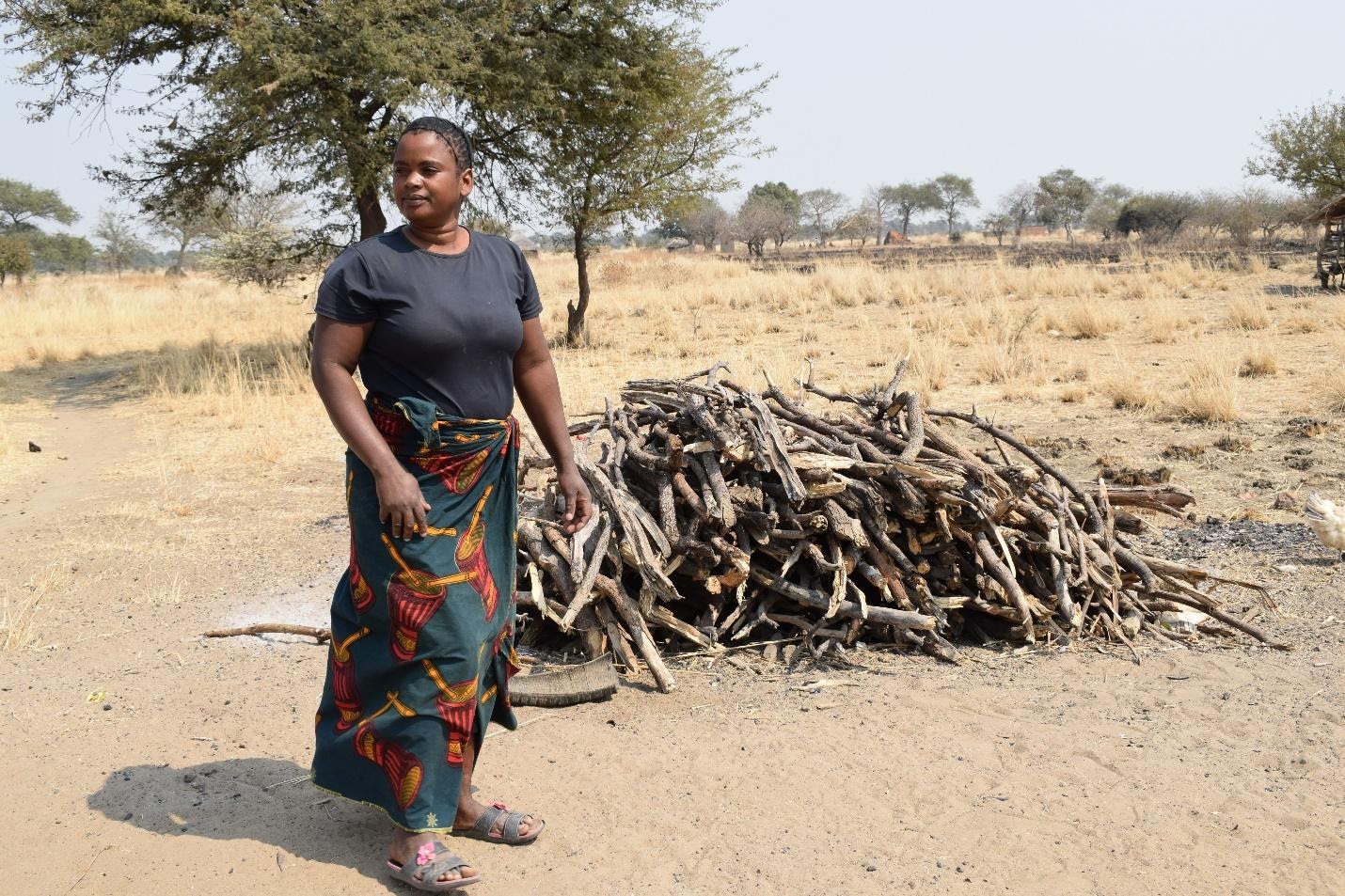
IMPROVED LIVELIHOODS AMONG LIVESTOCK FARMING WOMEN AND YOUTH IN ITEBE, ZAMBIA
Solidaridad and Grassroots Trust partnered to empower women livestock farmers with skills diversification through the Nambola project. With a focus on skills development and local access to resources, women are reporting increased savings, income diversification and positive outcomes throughout the community.
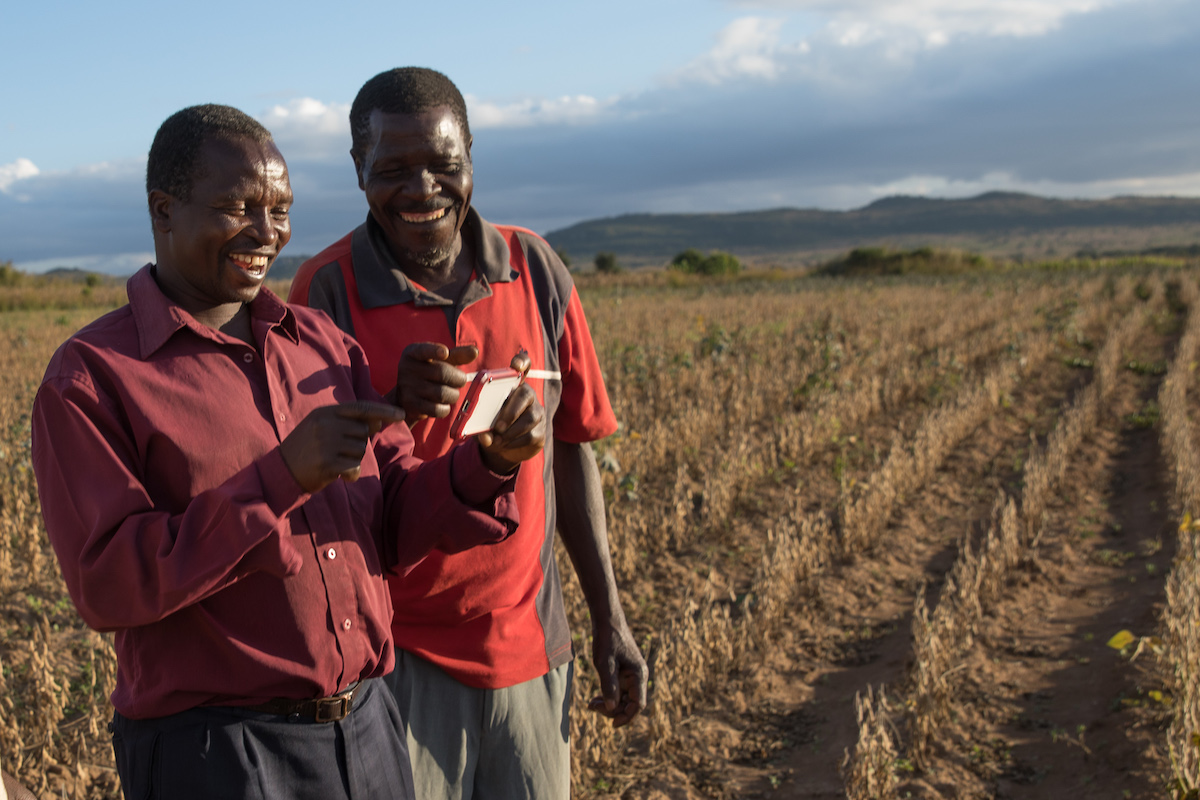
INCREASING DIGITAL ADOPTION AMONGST SMALLHOLDERS THROUGH WHATSAPP
The WADI Virtual Assistant serves as a nexus between farmer and extension officer. The virtual assistant enables the two to interact with and access information from multiple sources (satellites, weather services, soil testing, and logistics) with ease.
Innovation Areas
The power of inclusivity
Creating change that lasts
Making positive change that sticks requires an inclusive and bottom-up approach. Throughout our programmes, we emphasized appropriate and accessible digital solutions and finance, while maintaining a gender and youth lens to ensure that everyone truly benefits from the interventions.

One of the highlights of 2021 is the NAMBOLA Livestock programme’s award forTechnical Excellence in a Development Setting under SCALE’s Creative Green Adaptation Award. This award recognizes innovative actions to adapt and protect against climate change and will contribute to our ambition to position ourselves as a partner for the implementation and scaling of sustainable practices while ensuring the success of local farmers. Furthermore, in collaboration with the Global Alliance for the Future of Food (GA) and Climate Focus, we conducted an assessment on the extent to which food systems are integrated into the Nationally Determined Contributions (NDCs) for countries, including Egypt, Kenya, South Africa, and Senegal. The results will contribute towards creating an enabling policy environment for key players active in the food systems ecosystem as the recommendations serve as a guide for national policymakers and policy advocates to enhance NDCs to harness the potential for an integrated food system.
Southern Africa actively contributed to five key global digital innovations, specifically the establishment of a Data Warehouse for farmer information, a solution called FarmImpact, an impact platform called PING!, a movement to connect smallholder farmers to the data economy (FairData), and a project proposal to compensate farmers for their contributions to the reduction of carbon emissions.
The Southern Africa team also provided platforms and other software to Kvuno: a social enterprise that supports Solidaridad’s interventions. Solidaridad digital staff provided tools that enabled Kvuno to deliver services such as Z’wardy, Kvuno Sekls, and Kvuno Soil Labs. With this support Solidaridad and Kvuno jointly supported 60,000 farmers through Vuno Sekls (digital relationships enabled by farmerIDs and multiple apps). It provided 9,000 Euro valued incentives points and some rewards to smallholder farmers, and it listed 45,000 farmers on its Farmer2Market platform. Kvuno also recorded 22,676 individual training interactions between Solidaridad and farmers.
As part of our strategy to be data driven, Solidaridad Southern Africa engaged in a drive to create digital relationships with smallholder farmers by digitizing the farmer groups and transforming them into 238 digital circles (Sekls). The digital entry point is the lead farmer who gets resources and trained on the use of the suite of farmer applications. The farmer creates profiles for their group on the relevant applications and records the farm activities of the group members in their respective profiles and the granular data gets uploaded onto local servers for analysis and to inform decision makers. All farmers are registered and issued with a Solidaridad Farmer ID, their GPS is recorded, and fields mapped. An incentive initiative, Z’wardy, was also implemented to encourage the farmers to get digitally registered and adopt good practices.
The impact investment area gained a lot of traction in 2021. With support from funding sources such as Malim’bewu and PlusPlus, we were able to expand the team to include two additional team members, an Impact Investment and PlusPlus Coordinator based in Zambia and Associate in Mozambique. This allowed us to have a stronger footprint on the ground and do a more detailed country scoping for funders, build partnerships, support our programmes with financial literacy trainings, and further develop the Malim’bewu solution and proposition towards an end to end scaleable offering. Much effort has also been achieved in developing different farmer loan models including for irrigation kits (N-drip), production input (seeds) loans, and in-kind (Kfuya poultry) loans. These have been tested in our soy, livestock (poultry), and horticulture programmes in Zambia and Mozambique. At least 50 staff were trained as part of Training of Trainers efforts, and four sessions of 100 farmers were trained across the two countries.
Malim’bewu is a beyond training toolkit approach that empowers the farmer to make, manage, and invest money into their farm business and reap the rewards and ‘yields’ of their money. PlusPlus is a fintech platform that contributes to sustainable economic development by providing crowdsourced funding to agri-food smallholders in emerging markets.
Discussions are in the advanced stage for the development the Farmer Simulation Game (farming-as-a-business simulation training) that was tested with great results and that will integrate into the Malim’bewu proposition. PlusPlus got the most traction from having an in-country presence and there are currently six deals in Mozambique, three that have advanced to the pipeline, and seven deals in Zambia, four of which are in pipeline.
The gender and youth inclusion team provided on-going support to country programmes to implement and monitor specific deliverables and indicators within our main programmes. We supported IFAD team in training 50 enumerators (Zimbabwe) and 22 enumerators (Malawi) on the GALS (Gender Action Learning System) methodology and conducting focus group discussions for the inclusive red meat value chain project baseline exercise. Commodity programme managers for cotton, tea and african food products packaged gender and intersectionality findings for the purposes of presenting to the different commodity stakeholders in Malawi, Mozambique and Zambia. During the month of March 2021, we hosted six gender webinars to commemorate the international women’s month. Following these sessions, we created a gender mentorship booklet, which features women farmers within the agri-biz sector (these were identified through the SheFarms webinar series). We also conducted 12 youth mentoring and coaching sessions together with the Sizanani mentorship programme in South Africa, targeting youth in high schools (grade 10-12). The same were taken for farm visits to learn the basics of agriculture. Together with the Tanzania team, we are now exploring the expansion of our Agrilabs Youth interventions in East Africa from 2022. To institutionalize inclusivity at an organizational level in 2021, the Southern Africa team was on-boarded onto KAYA, which is an online learning platform that hosts Solidaridad’s gender training.
Organization & Governance
Keeping people at the centre
Walking the walk
Fairness and sustainability are at the heart of everything we do. That’s why we’ve continued to identify ways to support staff throughout the Covid pandemic, and searched for opportunities to reach new communities with creative partnerships and learning.

In 2021, Solidaridad Southern Africa employed 76 FTE, with a relative growth of women by 20 percent as envisioned. To drive the growth curve, the organizational development in the Southern Africa region focused on leveraging on regional/country gains, continuing our regional expansion, and contributing to the integration with East & Central Africa on shared knowledge platforms and synergy areas relevant to both regions. The senior management teams of East and Central Africa and Southern Africa had bilateral meetings to identify areas of synergy and pave the way for integration, while enhancing efficiencies and effectiveness. Alignment of HR systems and developing common communication approaches to promote inclusivity were used to improve the personal and professional development pathways for all staff.
Proactive and reactive pipeline development was encouraged in 2021 to improve the region’s financial sustainability. In 2021, we submitted over 30+ (gender-sensitive) grant applications with a success rate of 27 percent – where 15 percent represents applications where we were the lead applicant and the remaining 12 percent represents the applications where we were sub-applicants. We improved our diversification of funding sources by securing funding from new donors including the Southern African Development Community (SADC), Danone, Crossroads International, World Food Programme (WFP), AFR100 Initiative, the Enterprise Zambia Challenge Fund (EZCF), and Global Alliance for the Future of Food amounting to an additional amount of EUR 3,862,807. We were also more proactive in resource mobilization having submitted proposals to partner organizations, including Accenture, AGRA, and other development partners.
Solidaridad Southern Africa conducted five baseline studies in 2021. Three of the baseline studies were conducted under the RECLAIM Sustainability! programme (on cotton and textiles, tea and African food products) and two were conducted under the IFAD funded “K’Lusa: Inclusive Red Meat Value Chain” project being implemented in Malawi and Zimbabwe. The project baselines highlighted the need for enhanced policy environments and private sector engagement for a successful business ecosystem. There is also a need for clear government policies and statutory instruments that govern the value chains, and where they exist, we should reduce fragmentation and promote coordinated enforcement. Our smallholder farmers require fairer value for the prices and fair value distribution.
We have continued to emphasize our thought leadership position and leverage our partner’s shared impact by co-creating content for publicity. This has been achieved through the co creation of online campaigns and collaborations and speaking engagements in various conferences across the region. Solidaridad Southern Africa was one of the organizing partners for the ‘One Earth Root and Soil Health Forum’ launch alongside Agventure, Syngenta, African Seed Trade Association (AFSTA), and the Forum for Agricultural Research in Africa (FARA). The event hosted vital industry players, with over 800 attendees discussing ways to unlock the potential of better soil and root health to help transform food systems. Aligned with our thought leadership pursuits, we delivered a presentation at the 2021 Roundtable on Sustainable Biomaterials (RSB) Annual Conference. Our focus was on what it really means to scale the bio-economy from regional to global. The Dutch Embassy in Zimbabwe in collaboration with Magamba Network hosted the Green Media Bootcamp. Solidaridad provided climate change training to 12 participants including journalists, TV producers, fact checkers, and photographers. The IFAD-funded Inclusive red meat value chain project was launched in Malawi and Zimbabwe on the 28th October and 4th November 2021, respectively. These events were supported by IFAD and the respective governments in both countries.
The impact of our work is best showcased where the rubber meets the road — at field level. Consequently, we have revised our social media strategy to make our results and day-to-day activities more visible across our social media platforms and use the scale of our projects to harvest and share learnings. This strategic shift has played a critical role in building our credibility, increasing our engagements with partners and securing incremental gains for the Southern Africa office.
With two waves of the pandemic we had to put in place a system for electronically circulate and sign documents. We use it to sign relevant contracts and all our payment requisition documents. There has also been emphasis in utilizing digitized systems within other quality function areas (including finance, HR and PMEL) to improve efficiency and effectiveness.
Incidents or behavioral issues are reported verbally or online by the aggrieved individual the Regional Human Resource lead, Line Manager or Person of Trust. In general terms the way an incident or behavior can be reported safely depends on the pathway chosen by the person. Our responsible person (Person of Trust) also plays a role in advising them to review policies (including the Whistle Blower Procedures), advise on what they can do, and what steps should be followed.
In the year 2021 three cases were reported related to trust and/or integrity issues. The cases were handled in accordance with Solidaridad’s internal code of conduct and organizational policies, and the cases were concluded. The issues were discussed and resolved.
To improve the organization’s integrity system two colleagues were appointed to the positions of Person of Trust and Integrity Advisor, policies were developed and disseminated and all staff in the Southern Africa centre have signed and committed to the Solidaridad Code of Conduct. Several on-boarding workshops were held at Solidaridad Network level on Integrity and Trust issues, a workshop was held at regional level to inform all employees about Person of Trust and Integrity Advisor roles and responsibilities and an anonymized survey on integrity was conducted among all employees. Some measures are being taken to avoid inappropriate behavior, such as the training that was conducted for all regional staff. Also, a foundation has been set up with the appointment of the Person of Trust and Integrity Advisor to help employees get a point of reference for any situation that may arise.
Finance
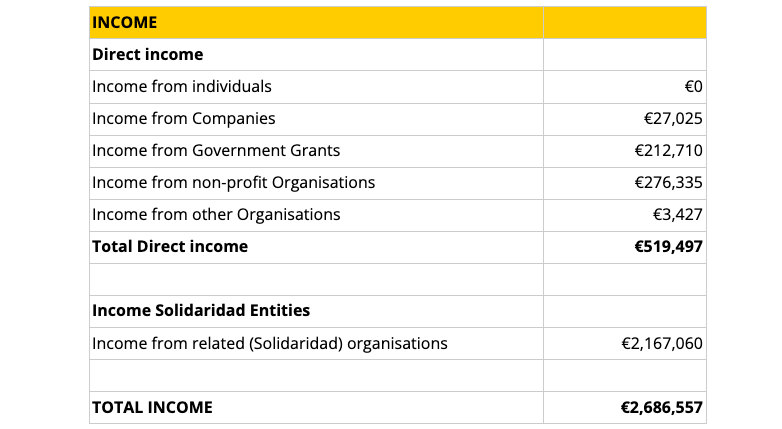
Solidaridad in Southern Africa reported an income of Euro 2.6 million in 2021, compared to a budget of Euro 3.4 million which meant a realization of 77% of budgeted income. The negative variance was a result of delays in the signing of contracts with the World Food Programme and Danone for implementation in Egypt, some unsuccessful funding applications as well as underspending in the Reclaim Sustainability programme throughout the region. Some of the initial activities in the Reclaim Sustainability program were delayed in the first year of implementation as activities were scaling up as well as being negatively impacted by COVID travel restrictions and it is anticipated that this will be caught up in the 2022.
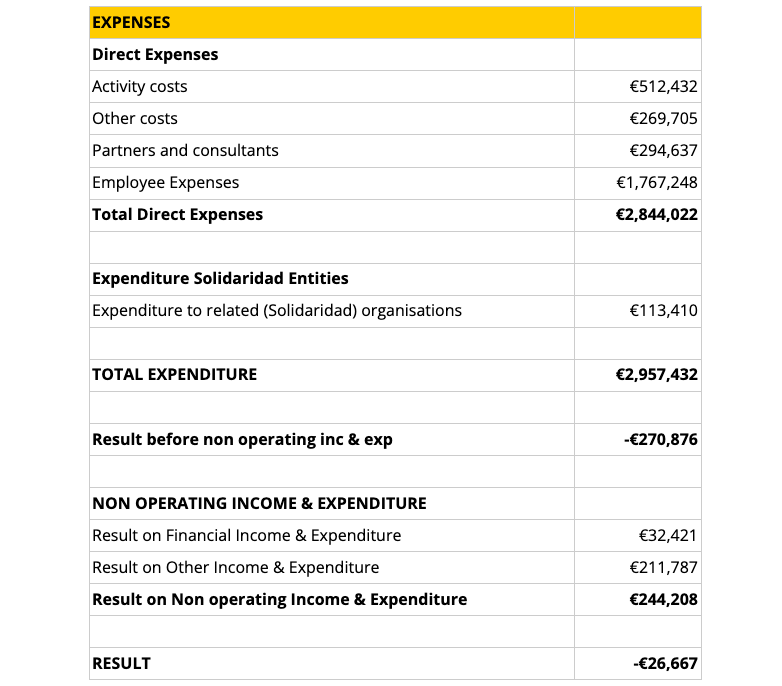
Expenditure for the year was also below budget at Euro 2.9 million compared to a budget of Euro 3.4 million, representing 86% of budgeted expenditure. The under expenditure was primarily due to the delayed project implementation on the two projects that were not signed during the year as well as due to the under expenditure on the Reclaim Sustainability programme.
The overall deficit for the year will be funded through foreign exchange reserves brought forward from previous years.
The audited financial accounts can be found below:

